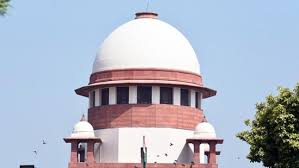According to the prosecution, the opinion of the expert ruled out any possibility of accidental fire from SAF carbine. It was also revealed by the father of the deceased that prior to the incident, the deceased had caught the accused and Shashi Bala in objectionable condition. Therefore, Shashi Bala and the appellant got annoyed and they threatened to kill the deceased. On the basis of the investigation carried out by the Crime Branch, Section 302 of IPC was applied while filing the chargesheet. (Para 2)
The High Court relied upon the testimony of PW13 Karim Baksh who stated that he heard the cry of the deceased “Mujhe Bachao” and sound of the firing of SAF. The witness stated that when he saw the deceased lying on the chair with bullet injuries, the appellant was telling PW12 Shashi Bala in Hindi “Madam aapne yeh kya karva diya, Mere to bache barbad ho jayenge”. According to the witness, Shashi Bala responded by telling the accused that: “tum phikr mat karo may bhi tumhare saath hu, court tak tumhara saath dungi”. The Court applied the doctrine of res gestae covered by Section 6 of the Indian Evidence Act 1872. (Para 4)
Both the witnesses have stated that they heard the cry “Mujhe bachao”. Surprisingly, PW25, who claims to have seen the incident has not deposed about any such statements made by the appellant, PW12 and the deceased. PW5 claims to have attended the funeral of the deceased. He admitted that as per the instructions of the father of the deceased, he met an inspector of the Crime Branch two months after the incident when his statement was recorded. Till that time, he did not report anything to the police about what he heard. PW13 stated that PW6, PW17 and certain other persons were present when he heard the accused making aforesaid statements. Both PW6 and PW17 did not support the prosecution. The others who were present according to PW13 were not examined by the prosecution. Therefore, the version of the prosecution about the appellant and PW12 making such statements does not inspire confidence. (Para 16)
Hence, the statement of an accused to which Section 6 is applicable cannot be treated as a confession of guilt. The statement becomes relevant which can be read in evidence as it shows the conduct of the appellant immediately after the incident. In any case, in the facts of the case, we have held that the version of the two witnesses who have deposed about the appellant making such statement does not inspire confidence. (Para 18)
The prosecution has failed to prove that the appellant had either any intention of causing the death of the deceased or the intention of causing such bodily injury to the deceased which was likely to cause his death. Assuming that when the appellant approached the deceased to stop him from using the telephone, he was aware that the change lever was not in a safety position, it is not possible to attribute knowledge to him that by his failure to keep SAF in the safety position, he was likely to cause the death of the deceased. The knowledge of the possibility of the deceased who was himself a policeman pulling SAF carbine cannot be attributed to the appellant. In fact, the appellant could not have imagined that the deceased would do anything like this. Thus, by no stretch of the imagination, it is a case of culpable homicide as defined under Section 299 of IPC as the existence of none of the three ingredients incorporated therein was proved by the prosecution. (Para 19)
However, there is a failure on the part of the appellant who was holding a sophisticated automatic weapon to ensure that the change lever was always kept in a safety position. This was the minimum care that he was expected to take while he approached the deceased. Thus, there is gross negligence on the part of the appellant which led to a loss of human life. Due to his rash and negligent act, the deceased lost his life. Therefore, the appellant is guilty of a lesser offence punishable under Section 304A of IPC for which the maximum sentence is imprisonment for two years. The appellant has undergone a sentence of more than eight years. (Para 20)
Hence, the appeal is partly allowed. The conviction of the appellant under Section 302 of the IPC is set aside and he is held guilty of committing the offence punishable under Section 304A of IPC. The appellant has undergone the maximum sentence prescribed for the said offence. Hence, his detention in prison is no longer required. Hence, his bail bonds are cancelled. (Para 21)
SUPREME COURT JUDGMENT
Citation: 2023 STPL(Web) 69 SC
ARVIND KUMAR Vs. STATE OF NCT, DELHI
Criminal appeal no. 2390 of 2010-Decided on 17-7-2023
Click to See Full Text of Judgment: 2023 STPL(WEB) 69 SC







